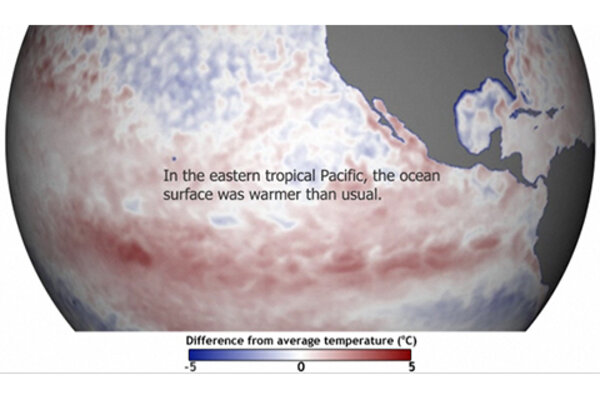Videos
Arctic Oscillation Left Its Mark on N. Hemisphere 2010 Temps
A pattern of unusually warm and cold spots alternated around high northern latitudes in 2010—a classic sign of the negative phase of the Arctic Oscillation.

2010 Began with El Niño, Ended with La Niña
August 9, 2011
Predicting El Niño and La Niña Events
Computer climate models help scientists such as Dave Dewitt predict the life cycles of individual El Niño or La Niña events and their effects on weather patterns throughout the world. While the accuracy of these models continues to improve, they still have limitations.
The Effects of Climate Change on El Niño and La Niña
Will climate change affect frequency or intensity of El Niño and La Niña? There is still little consensus among scientists on this, explains the International Research Institute for Climate and Society’s Lisa Goddard.
Impacts of La Niña in Africa
El Niño and La Niña can significantly alter seasonal climate conditions, such as temperature and rainfall patterns, in many parts of the world. Scientists Brad Lyon and Paul Block explain the potential impacts of La Niña in different parts of Africa.
2011's Climate Extremes: Drought, Heat, and Flooding
More than half of the United States experienced heat, drought, or flooding during 2011, demonstrating the power and momentum of climate extremes.
Drought Grips Hawaii in 2010
Few winter storms and El Niño conditions brought severe drought conditions to the Hawaiian Islands this past year.
Coral Bleaching Alarm for 2010
Mark Eakin, a coral reef specialist and Coordinator of NOAA’s Coral ReefWatch program, discusses coral bleaching in the Caribbean in 2010.
State of the Climate in 2009
This report presents a comprehensive appraisal of Earth’s climate in 2009, and establishes the last decade as the warmest on record. Reduced extent of Arctic sea ice, glacier volume, and snow cover reflect the effects of rising global temperature.

Does a Warmer World Make Hurricanes Stronger?
May 28, 2010
How Is Climate Change Impacting Coasts?
Six managers of State Coastal Zone Programs and National Estuarine Research Reserves comment on their plans for adapting to climate change.
The Origin and Impacts of Ocean Acidification, Part 1
Richard Feely discusses new findings about how increased carbon dioxide in the atmosphere is making the oceans more acidic, and how that will affect ocean ecosystems and the marine animals that inhabit them.